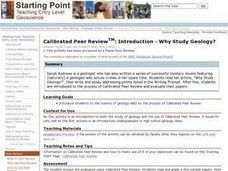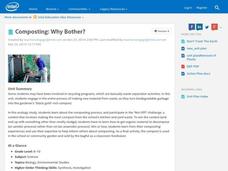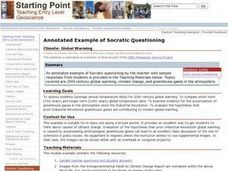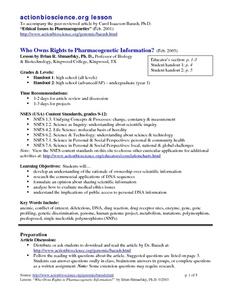NASA
Revising an Investigation
Write, edit, and then revise! The fourth lesson plan in a five-part series asks peers to provide feedback on research. Individuals then use the research to edit and revise conclusions and develop their presentations.
Science 4 Inquiry
Rocks Makin' Rocks: Rock Cycle Simulation
Scholars review prior knowledge before completing a hands-on simulation of the rock cycle. They write stories or songs summarizing their simulations to demonstrate mastery.
Curated OER
You Can Stop!!
Students analyze smoking behavior based on peer pressure. In this health lesson, students read and complete worksheets on the internet concerning the behaviors associated with smoking. They summarize what they have learned by...
Curated OER
Calibrated Peer Review: Introduction-Why Study Geology?
Young scholars read an article written by Sarah Andrews, a geologist who has written mystery novels featuring a geologist who solves crimes. After reading the article, students write an essay based on a Writing Prompt and begin peer...
Science 4 Inquiry
Eukaryotic Cells: The Factories of Life
Eukaryotes include humans, animals, and plants. Scholars learn about the parts of eukaryotic cells. They design models of a store and match the correct function of each part to the function of a part of the cell. They review their...
Smithsonian Institution
Vaccines! How Can We Use Science to Help Our Community Make Decisions about Vaccines?
Uncover the fascinating world of vaccines in a multifaceted activity. Investigators explore community perception and the science of vaccines with eight tasks. Scientists continue their studies by giving and reviewing surveys, analyzing...
Curated OER
Hand Lotion Analysis
Students prepare a sample of a commercial hand lotion for analysis by HPLC to determine the percent composition of two common cosmetic preservatives, methylparaben and propylparaben. They perform the analysis and the data is evaluated to...
Curated OER
Degradation and Weathering of Polymeric Materials
Young scholars investigate issues of degradation and weathering of polymeric materials during their useful life. They evaluate photodegradable plastics and their viability as an environmental solution for litter and investigate the...
Workforce Solutions
On the Job
Four lessons spotlight a variety of professions while boosting listening and observational skills and making inferences. Lesson one challenges pupils to group cards based on a commonality then justify the relationship they see....
Curated OER
Changing Seasons
Explore expository writing and using precise language in this descriptive paragraph writing lesson. Learners brainstorm prior knowledge about the changing seasons in Ohio. They describe seasonal items, view seasonal pictures from...
Curated OER
Martian Colony Proposals
Ninth graders design a proposal for a Martian colony to be presented to a group of their peers. They review their knowledge of Mars. Students evaluate for themselves which of their classmates proposal best fits their criteria.
National Center for Case Study Teaching in Science
Life on Mars
Through reading and discussion, aspiring astronomers consider the question of whether or not there was ever life on the planet Mars. Throughout the process, they review how scientific investigations are carried out, examine the...
Intel
Composting: Why Bother?
The first STEM lesson in a group of 10 explores composting. After discussing how to make a better tomorrow, classes are challenged to track garbage in their communities, visit a local waste management facility, and conduct a survey...
Integrated Physics and Chemistry
Law of Conservation of Matter
Does mass change during a chemical reaction? Demonstrate the Law of Conservation of Matter while encouraging class members to be creative with a two-part lesson. First, learners use Alka-Seltzer® tablets and water to demonstrate the...
Curated OER
Pulling It All Together
Students review data about a health problem and prepare an investigative report. Teams trade reports and utilize skills developed from previous lessons to evaluate the critical thinking evident in the reports.
Curated OER
Levers
Fifth graders participate in a review discussion of the parts of a lever, resistance or load, fulcrum, and effort. Next, they complete activities at six experiment stations while collecting data that they share with the class. While...
Curated OER
Solar Racing
Learners harness the power of the sun to design, construct and evaluate a solar-powered model car of their creation. They race their cars in a "Solar Sprint" race modeled after the National Renewable Energy Laboratory's Junior Solar...
Science Matters
Basic Needs
Scholars take part in a grand conversation about the basic needs of living things. Working collaboratively, pupils brainstorm and identify similarities to come to the conclusion that the environment meets the needs of all living...
Space Awareness
Meet Our Neighbors: Sun
The sun isn't just a ball of yellow! Young scientists learn about the features of the sun using a hands-on modeling activity. They build models of the sun using common household items to represent sunspots, solar prominence, and the...
Curated OER
Global Temperatures
Students analyze the global temperature record from 1867 to the present. Long-term trends and shorter-term fluctuations are both evaluated. The data is examined for evidence of the impact of natural and anthropogenic climate forcing...
Curated OER
Annotated, Detailed Example of Socratic Questioning
Students identify and define the main components of the hydrosphere and the ways in which they interact with one another. They explore how changes in Earth's surface materials affect components of the hydrosphere and evaluate the effect...
Curated OER
Using Mass Balance to Understand Atmospheric CFCs
Students use an interactive online mass balance model to observe levels of chlorofluorocarbons over the past few years. Students evaluate the influence protocol emissions will have on the future levels of CFCs.
Curated OER
Annotated Example of Socratic Questioning: Climate: Global Warming
Learners compare and discuss short-term and longer-term global temperature data. They evaluate data from three sets of graphs and then participate in a structured whole class Socratic discussion on the possible causes of climate change.
Curated OER
Who Owns Rights to Pharmacogenetic Information?
Students develop an understanding of the rationale of ownership over scientific information. They research commercial applications of DNA sequences. They analyze how to evaluate medical ethics issues.























